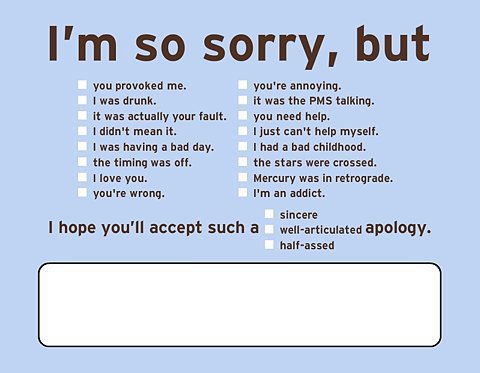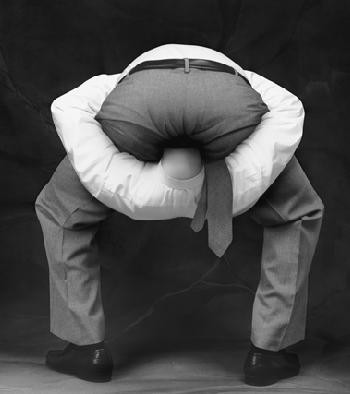Most of what I do as a counselor, besides deep listening, is to help hold pain. Injuries linger long after the horror of events/words have slithered across my clients’ fragile hearts. Age matters not a bit; traumas big or small, remain. One reason I’m contracted to assist in the soothing of psychic wounds is that the ‘perpetrators’ and witnesses haven’t acknowledged the hurt, haven’t apologized. Or they’ve apologized in a vague way: I’m sorry I hurt you, instead of stating what they did: I’m sorry I called you a bitch in the kitchen on Saturday. No matter how angry I am, I shouldn’t call you names.
Apologies don’t always have to mean you’re wrong, the other’s right, you did anything deliberately. They’re more about empathy, about caring that the other’s hurt, that the relationship means more to you than your self-pride or the polarized world of right/wrong, bad/good.
No one wants reasons either, at least not up front; those won’t salve the wound. There can be explanations but only after one is attentive to the others’ pain. Apologies are not about you or about being forgiven; they’re about compassion. [see mi dispiace, i apologize, i’m sorry. was that so hard?]
My friend, “Fred,” was often left waiting for his dad to pick him up from elementary school, sometimes over two hours, as other kids left, then teachers, then janitors…there was Fred leaping on curbs, skidding rocks and otherwise entertaining himself until his dad finally showed. Before Fred could get into the car he’d hear, “Wow, you’ll never guess who I met up with,” or “The coolest thing happened,” ad nauseum. Fred wasn’t given an apology but a “fun” excuse so there wasn’t room for him to have his own feelings of frustration, fear or anger—but he’d learned long before 3rd grade to suppress pretty much any true emotions around his self-absorbed parents.
Once, when Dario was two-ish, we biked past a crying toddler. He became distressed and asked me to turn back to “see her again” suggesting we hug her. By then her mom was there comforting. For the rest of the ride home, Dario continued to postulate why she’d been crying and what we might’ve done to “happy her.” There’s nary a young kid who doesn’t have natural empathy.
This is what happens to empathy:
- If you don’t receive any you don’t have any to give. You can’t dispense something you rarely feel. If apologizing is seen as weakness or fulfilled in right/wrong thinking instead of a compassionate act of soothing distress, pride sets in and spins kindness into selfishness.
- Our paradigm shames or belittles those who want to care, who’re exhibiting emotional pain or grief and often reveres those who don’t. It’s manly to disregard needs in others, in themselves, to not cry, to be “strong.”
Ironically, compassion is where true strength lives.
Attempt an apology that’s NOT about defending your position. Instead: Listen! Accept another’s suffering whether you think it’s justified or not. Remember? It’s not about you. What you think doesn’t really matter. Lastly, be specific and ask what can be done to resolve the hurt. There’ll be space for explanations, for your opinion afterwards. Be a soft witness to the other first. Especially with children—Please! But truthfully, we all have a “fair/unfair meter” within us and we hunger for this same tender treatment.



